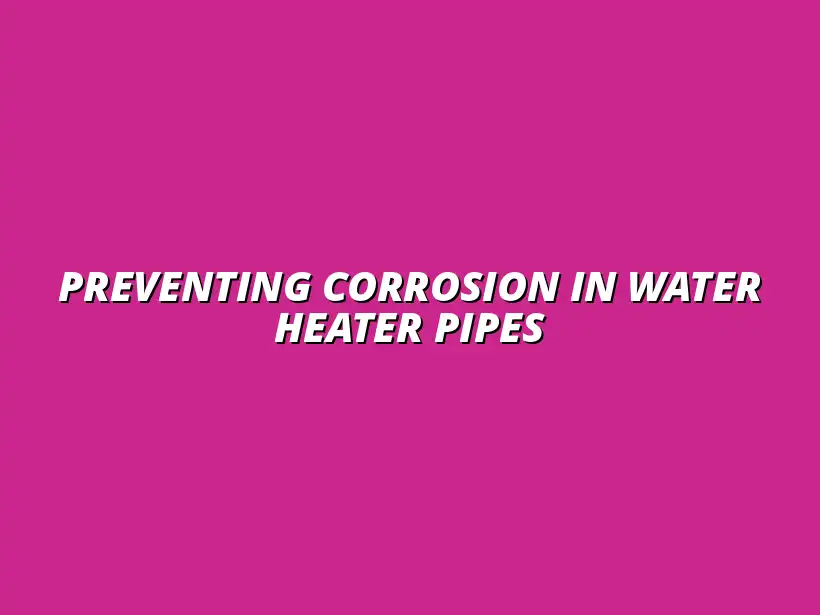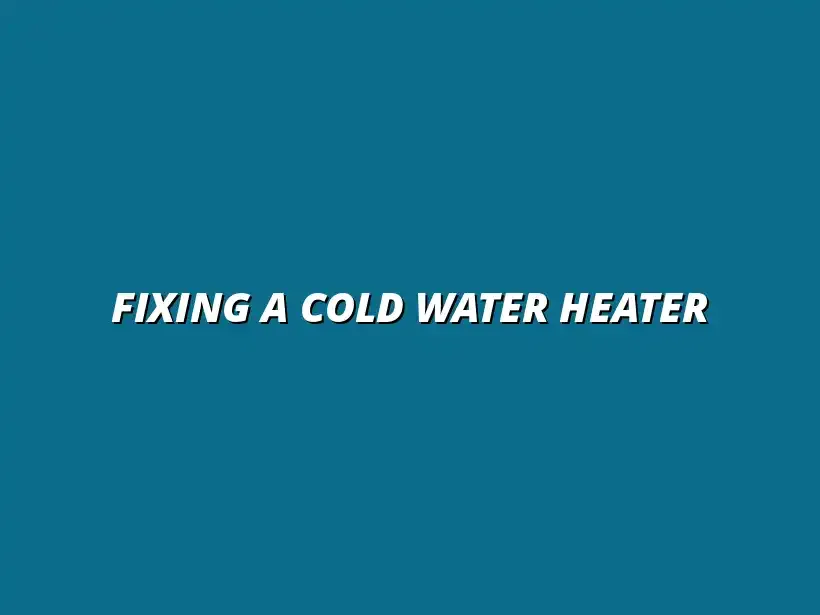
Preventing Corrosion in Water Heater Pipes
Understanding Corrosion in Water Heater Pipes
Corrosion in water heater pipes is a common problem that many homeowners face. Understanding the factors that contribute to this issue can help you take proactive steps to maintain your plumbing system. Corrosion can lead to leaks, water damage, and costly repairs, which is why it’s essential to stay informed about its causes and signs. Learn more about preventing pipe leaks with regular maintenance here.
What Causes Corrosion in Water Heater Pipes?
Corrosion occurs when water interacts with metal pipes, leading to deterioration. One of the primary causes is the quality of the water itself. High levels of minerals and impurities, such as chlorine or sulfates, can accelerate the corrosion process. Additionally, water pH levels play a significant role; acidic water tends to corrode pipes faster than neutral water.
The Role of Water Quality in Corrosion
The quality of water in your home can significantly affect the lifespan of your water heater pipes. Hard water, which contains high levels of calcium and magnesium, can lead to the buildup of scale. This scale can not only reduce water flow but also create a conducive environment for corrosion to thrive. Regular testing of your water quality can help identify and mitigate these issues. For tips on preventing corrosion in your kitchen pipes, check out this helpful guide: Preventing Pipe Corrosion at Home.
Moreover, if your water supply has a high chloride content, it can be particularly damaging. Chlorides can lead to pitting corrosion, which can cause small holes in the pipes. To combat this, consider using water softeners or conditioners that can effectively reduce these harmful elements.
Impact of Temperature and Pressure on Pipe Longevity
The temperature and pressure of water traveling through your pipes can also affect their durability. High temperatures can increase the rate of corrosion, particularly in metal pipes. If the temperature exceeds 140°F, it can cause the pipe material to weaken over time.
Likewise, excessive pressure can stress pipes and lead to premature wear. It's important to maintain the pressure within the manufacturer's recommended range to ensure the longevity of your water heater pipes. Regular monitoring can help you catch and rectify these issues before they escalate. Understanding how to prevent bathroom plumbing corrosion can also be beneficial: Prevent Bathroom Plumbing Corrosion Tips.
Signs of Corrosion in Water Heater Pipes
Being aware of the signs of corrosion can help you catch problems early. Look for any visible indications of leaks, such as water stains or discoloration on walls and ceilings. These can be signs that your pipes are corroded and failing, which could lead to more extensive damage. For comprehensive guidance on preventing corrosion in water heaters, visit: Preventing Corrosion in Water Heaters.
Visual Indicators of Pipe Damage
There are several visual signs to watch for that indicate corrosion in your water heater pipes:
- Rust or discoloration on the pipes
- Flaking or peeling paint around the pipes
- Leaking or dripping water
- Unusual sounds such as banging or popping in the pipes
If you spot any of these signs, it's essential to take action promptly. Ignoring these indicators can lead to larger, more costly repairs down the road!
Common Symptoms of Corrosion-Related Problems
In addition to visible damage, you may experience other symptoms that suggest corrosion issues. Some common symptoms include:
- Discolored or rusty water
- Low water pressure
- Unpleasant metallic taste or odor
- Frequent water heater malfunctions
Understanding these symptoms can empower you to address potential problems before they become major issues. Taking action now can help ensure your water heater system remains in good working condition! For essential water heater maintenance tips, see: Essential Water Heater Maintenance Tips.
Addressing Common Concerns About Water Heater Pipe Maintenance
Can DIY Maintenance Prevent Corrosion Effectively?
Many homeowners wonder if they can take care of their water heater pipes on their own. DIY maintenance can indeed help prevent corrosion, but it comes with both benefits and limitations. On one hand, simple tasks like flushing the water heater and inspecting for leaks can save money and extend the life of your system.
Yet, it’s crucial to recognize that not all maintenance tasks are suitable for DIY. Complex issues, such as significant corrosion or pressure problems, often require expert evaluation. You want to ensure that your efforts are effective, so knowing when to call in a professional is vital!
- Regular inspections for leaks or signs of wear.
- Flushing the water heater periodically.
- Checking temperature and pressure relief valves.
Benefits and Limitations of DIY Approaches
DIY maintenance offers several benefits, including cost savings and the satisfaction of keeping your home in good shape. However, it’s essential to understand its limitations. For instance, while you might be able to handle basic tasks, untrained individuals may overlook hidden issues that could lead to more significant problems down the line.
Moreover, some maintenance tasks require specific tools or knowledge. If you're unsure about any aspect of your water heater, it might be best to consult with a professional to avoid potential mishaps. Regularly performing maintenance while understanding your limits can lead to effective results!
When to Know If DIY Isn’t Enough
There are certain signs that indicate your DIY efforts may not be sufficient. If you notice frequent leaks, unusual noises, or water discoloration, it's time to call in a professional. For example, if you are in Billesley, Birmingham you can find a local plumber here. Additionally, if you find that your water heater is constantly needing repairs, that’s a clear signal that you may need expert assistance.
Remember, being proactive can save you from costly repairs. Don't hesitate to reach out for help when you feel out of your depth! Regular professional maintenance can offer peace of mind and keep your water heater running efficiently.
What Are the Long-term Effects of Neglected Pipe Maintenance?
Neglecting maintenance on your water heater pipes can lead to serious consequences over time. One of the most significant effects is the potential for costly repairs. Corrosion can lead to leaks, which in turn can damage your home and require costly repairs that are often far greater than the price of regular maintenance.
Furthermore, ignoring maintenance can mean your system works harder than necessary, ultimately affecting its lifespan. A well-maintained water heater can last much longer, saving you money in the long run!
- Increased risk of leaks and water damage.
- Higher energy bills due to inefficiency.
- Reduced lifespan of the water heater.
Potential Costs Associated with Neglected Maintenance
When maintenance is neglected, the potential costs can add up quickly. You might face expenses from emergency repairs, increased utility bills, or even the need for a complete system replacement! These expenses can strain your budget and create unnecessary stress.
Investing a small amount in regular maintenance can help prevent these costs. It’s always more cost-effective to maintain your system than to pay for repairs or replacements that could have been avoided. Keeping an eye on your water heater is key!
How Corrosion Affects Energy Efficiency
Corrosion can significantly impact the energy efficiency of your water heater. When pipes corrode, they create blockages and reduce water flow, making the system work harder to heat water. This increased effort leads to higher energy consumption and, ultimately, higher utility bills.
By preventing corrosion through regular maintenance, you can keep your water heater running at optimal performance. A well-maintained heater not only saves energy but also prolongs the life of the appliance—making it a win-win situation! Annual inspections are highly recommended; learn more about their importance here.
Implementing a Comprehensive Maintenance Strategy
Developing a Schedule for Regular Maintenance Tasks
Creating a maintenance schedule is essential for ensuring your water heater operates efficiently. Regular tasks should be outlined and planned out to avoid any lapses in care. A well-organized calendar can help remind you when it's time to perform specific maintenance tasks!
Here are some best practices for creating your maintenance calendar:
- Include monthly checks for leaks and temperature settings.
- Schedule seasonal flushing of the water heater.
- Set reminders for professional inspections at least once a year.
Best Practices for Creating a Maintenance Calendar
To create an effective maintenance calendar, consider factors like your water usage and the type of system you have. Write down tasks that need to be completed and their recommended frequency. Utilizing apps or planners can also aid in keeping track of these maintenance tasks.
Consistency is key! Staying organized will help ensure that you don't miss important maintenance tasks, keeping your water heater in top shape year-round.
How to Stay Consistent with Maintenance Tasks
Staying consistent with your maintenance tasks can be a challenge, but there are several methods to help you follow through. One effective strategy is to set calendar alerts or reminders on your phone. This way, you’ll receive notifications when it’s time to check or perform maintenance!
Additionally, involving family members can create a sense of shared responsibility. Assigning specific tasks or duties can help ensure that your water heater maintenance stays on track. Teamwork can make maintaining your water heater easier and more enjoyable!
Educating Yourself and Family Members on Water Heater Care
Knowledge is power, especially when it comes to maintaining your water heater. Educating yourself and your family about the proper care can lead to better maintenance practices. There are many resources available, including online guides, local workshops, and manuals that can provide valuable insights!
Taking the time to learn about water heater maintenance goes a long way in preventing issues down the line. Make it a family project—everyone can contribute to keeping your home safe and efficient!
- Online articles and videos on water heater care.
- Local courses or workshops on home maintenance.
- User manuals for specific water heater models.
Resources for Learning About Water Heater Maintenance
There are plenty of resources available to help you learn about water heater care. Websites, forums, and YouTube channels dedicated to DIY home maintenance can be invaluable. They often provide step-by-step guides, tips, and troubleshooting advice to help you manage your system.
Make sure to check out your local library or community center, too! They may offer workshops or access to books on home maintenance that can deepen your understanding of how to care for your water heater.
Involving Family Members in Preventative Care
Getting your family involved in maintenance tasks can be beneficial and educational. Teach them the basics of what to look for, like leaks or unusual noises. This not only spreads knowledge but also creates a collaborative environment for caring for your home!
Assign tasks based on age and capability—everyone can play a role in maintaining the water heater. Working together can help everyone feel more responsible and connected to the care of your home!
Final Thoughts on Maintaining Your Water Heater's Pipes
Summarizing Key Maintenance Benefits
Regular maintenance of your water heater pipes brings numerous benefits. It can help you avoid expensive repairs, improve energy efficiency, and extend the life of your system. By taking proactive steps, you can enjoy a well-functioning and reliable water heater!
Additionally, the peace of mind that comes with knowing your water heater is in good shape is priceless. A little bit of effort in maintenance now can lead to significant savings and safety for your home!
The Importance of Proactive Maintenance in Preventing Corrosion
Being proactive with maintenance is essential for preventing corrosion. Regular checks, flushing, and timely repairs can help ensure your pipes stay in great condition. When you prioritize maintenance, you’re investing in the long-term health of your water heater!
Remember, a small investment in time and effort can save you from much larger headaches later on. Keeping your water heater pipes healthy should be a priority for every homeowner!
Long-term Savings Through Regular Care
Regular maintenance not only helps prevent issues but also leads to long-term savings. By keeping your water heater in optimal condition, you can lower energy bills and reduce the risk of future repairs. Your wallet will thank you for the proactive care!
Moreover, a reliable water heater means less hassle in your daily life. Being able to trust that your hot water will be there when you need it is a significant comfort!
Encouraging Action Toward Better Water Heater Maintenance
Now that you understand the importance of maintaining your water heater, it's time to take action! Start by setting up a maintenance schedule and educating yourself and your family. Every small step you take today can make a difference in the longevity of your water heater!
Consider reaching out to professionals for inspections or advice as well. Establishing a connection with a reliable plumber can make maintenance easier and ensure your system is always in peak condition!
Steps to Take Today for Improved Pipe Longevity
Here are some steps you can take today to improve the longevity of your water heater pipes:
- Inspect your water heater for any visible signs of wear.
- Flush the tank to remove sediment build-up.
- Create a maintenance calendar and stick to it!
Connecting with Professionals for Regular Maintenance
Don't hesitate to connect with professionals if you need help! Finding a reliable plumbing service is essential for ensuring your water heater receives the care it needs. Professional maintenance can help you catch potential issues early and keep your system running smoothly.
In the end, regular care and proactive measures will ensure your water heater pipes last longer and perform better. By taking these steps, you're not just protecting your water heater—you're protecting your home!




